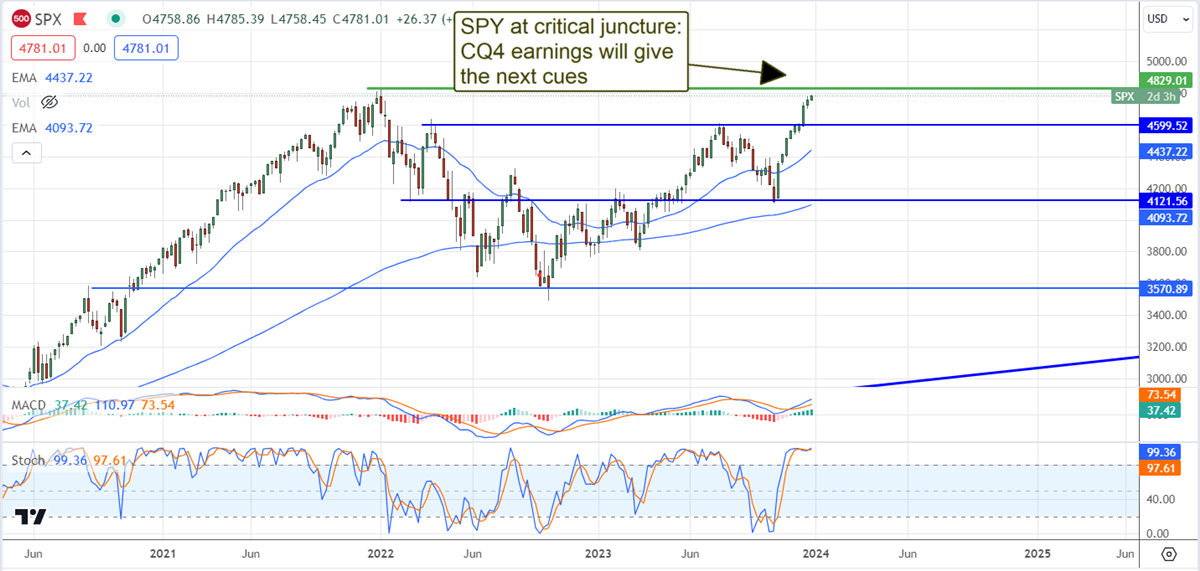
The New Year is almost upon us and, with it, the next earnings reporting cycle. The calendar Q1/fiscal Q4 cycle is expected to bring another quarter of growth for the S&P 500 (NYSEARCA: SPY) and may set it up for big gains in 2023.
Because earnings are expected to grow every quarter in 2024, and growth will accelerate sequentially throughout the year, there is a significant chance the S&P 500 will rally not just to a new high but substantially higher than where it is now. In this scenario, the upward lift provided by earnings could take the S&P 500 650 points above the current all-time high, a significant pivot point for the market.
The caveat is that trends in place could cap gains by the end of the Q1 reporting season. Those trends include a steadily declining outlook for earnings growth that has yet to cease. While the Q4 2023 results may be better than expected, the consensus figures for Q1, Q2 and the remainder of the year are expected to decline as guidance impacts the outlook. If those declines are enough to offset the Q1 strength, the market will have difficulty moving higher. In this scenario, the market could become capped at the current highs or above, setting the market up for a major sell-off later in the year.
The S&P 500 sustained growth in Q4, but how much?
The S&P 500 is expected to have sustained growth in Q4, but how much? The latest data from Factset shows consensus for Q4 earnings at 2.4% compared to last year, which is down from its highs but likely below the final figure for the quarter. The S&P 500 tends to outperform the consensus figure at the start of the reporting cycle by at least a few hundred basis points and outperformed by 300 in Q3. This puts the target for final growth near 5.5%, an acceleration from the prior quarter.
Regarding sectors, five of the eleven S&P 500 sectors are expected to report a YOY decline in earnings, and six will be below average. The top sector for growth is forecasted to be Communications Services (NYSEARC: XLC), led by Meta Platforms (NASDAQ: META). Communications Services is expected to grow earnings by more than 40% and may outpace consensus by a wide margin. Meta Platforms is forecasted to grow calendar Q4 results by 14% on the top and 12% on the bottom sequentially, with the YOY comps closer to 22% and 180%, respectively.
Utilities (NYSEARCA: XLU), Consumer Discretionary (NYSEARCA: XLY) and Information Technology (NASDAQ: XLK) are also expected to show some strength. Utilities will have the 2nd strongest earnings growth, followed by Discretionary and Technology. Technology has the greatest odds of outperformance due to AI and expected results from most of its top-ten holdings. Microsoft (NASDAQ: MSFT) is the largest holding in the index and is expected to grow earnings by 19% on a 15% increase in revenue. NVIDIA (NASDAQ: NVDA) is a smaller holding but is expected to grow earnings by triple-digits. Apple (NASDAQ: AAPL) is also expected to show growth.
Growth in Q4, but what about guidance for 2024?
If results get the market to move higher, the guidance will keep it there. As it is, the consensus for 2024 is for earnings growth in the range of 11.5%, which is a substantial acceleration from the roughly 0.5% in YTD 2023. However, based on the trends, we can expect the consensus figures for all four quarters of 2024 to decline by the end of the CQ1/FQ4 reporting period and lower this figure.
The consensus figure for 2023 gives us a baseline for how much of a decline in the consensus we can expect for FY 2024 during the next 12 months. The 2023 consensus declined from a high near 10.5% to the current 0.5%, suggesting a 1000 basis point decline is possible for 2024. In this scenario, the FY2024 will produce only 1.5% YOY earnings growth, a tepid figure unlikely to sustain lofty index prices, and that assumes Q4 results won’t be disappointing.
The technical outlook: the S&P 500 is at a critical juncture
The S&P 500 is in rally mode and may move to a new high in 2024. The risk is earnings and the outlook for the year, which will be impacted by the Q4 earnings reporting cycle and guidance. For investors, the risk is that results and guidance will be less than expected, even with an expectation for weakness and a decline in forward guidance priced into the market. The risk for bears is that earnings growth is back, and acceleration is expected throughout the year, a tide that could lift the market regardless of dwindling forecasts. This makes January as important as ever. If the market can set a new high, the rally should continue. If not, the rolling bear market is still in effect.






